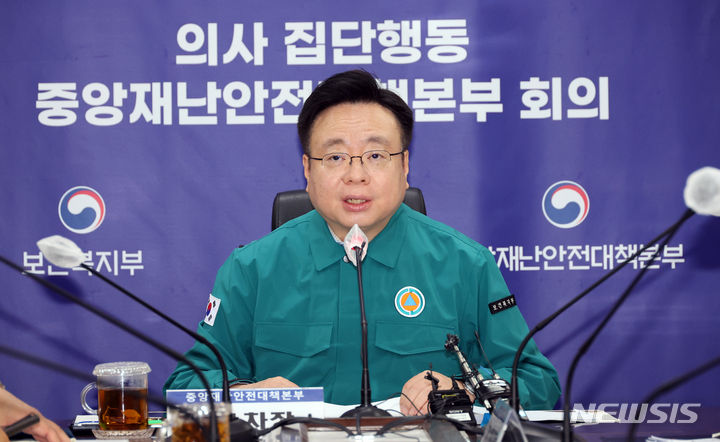Physical Address
304 North Cardinal St.
Dorchester Center, MA 02124
Physical Address
304 North Cardinal St.
Dorchester Center, MA 02124

South Korea has been facing significant challenges in its healthcare system due to the collective action of doctors, which has resulted in restrictions on emergency medical care. This has had a profound impact on both medical services and patient care throughout the country.
One of the immediate effects of the doctors’ collective action is the increase in the number of emergency medical centers displaying “treatment restrictions” messages. As a result, a total of 16 centers have implemented such measures, indicating a growing trend of limited medical services.
Furthermore, there has been a noticeable decrease in the number of patients admitted to general wards and intensive care units. The number of patients in general wards has decreased by 3.7%, while the number of patients in the intensive care units of tertiary hospitals has decreased by 1.5%. These figures reflect the difficulties patients are facing in accessing the necessary medical services they require.
The impact of the collective action is particularly evident in specialized medical care, such as ophthalmology and obstetrics. Specific departments providing essential treatments have been subjected to treatment restrictions, exacerbating the challenges faced by patients in need of specialized care.
The consequences of the doctors’ collective action extend beyond immediate restrictions on medical services. The need for alternative personnel and expanded support measures for doctors and nurses highlights the strain on the healthcare system caused by the ongoing collective action. The Ministry of Health and Welfare has made efforts to dispatch additional personnel and provide financial support to alleviate this burden.
Moreover, the Ministry has been compelled to extend the application deadline for government subsidies for emergency medical institutions. This extension underscores the financial challenges faced by these institutions and the necessity for additional support to ensure their continued operation.
The collective action of doctors opposing the expansion of medical school admissions has had a significant impact on medical services and patient care in South Korea. The restrictions on treatments, decrease in patient admissions, and burden on the healthcare system all contribute to creating a challenging environment for patients in need of medical care.
It is crucial for the government and healthcare authorities to find prompt solutions to address these issues and ensure the provision of quality healthcare services to all citizens.
The collective action of doctors in South Korea has resulted in a significant decrease in access to emergency medical care for patients. The restrictions imposed on medical services have limited the availability of necessary treatments and procedures, causing patients to suffer from delayed or inadequate care.
With the increase in the number of emergency medical centers displaying “treatment restrictions” messages, patients are facing difficulties in receiving immediate and critical care. This has led to a higher risk of complications and prolonged suffering for those in need of urgent medical attention.
The collective action of doctors has also led to a decrease in the number of patients admitted to general wards and intensive care units. This decline in admissions indicates that patients requiring hospitalization are facing challenges in accessing the necessary care and support they need.
As the number of patients in general wards decreased by 3.7% and the number of patients in intensive care units of tertiary hospitals decreased by 1.5%, it is evident that the collective action of doctors has directly impacted the availability of critical care services for patients in need.
Patients requiring specialized medical care, such as ophthalmology and obstetrics, have been significantly affected by the collective action of doctors. The restrictions imposed on these specific departments have resulted in limited access to essential treatments, exacerbating the challenges faced by patients with specialized healthcare needs.
As a consequence, patients who require specialized care are forced to seek alternative options or face delays in receiving the necessary treatments, leading to prolonged suffering and potential complications.
The ongoing collective action of doctors has placed a considerable burden on the healthcare system in South Korea. The need for alternative personnel and expanded support measures for doctors and nurses highlights the strain caused by the collective action on the overall functioning of the healthcare system.
The Ministry of Health and Welfare’s efforts to dispatch additional personnel and provide financial support reflect the urgent need to address the strain on the healthcare system. However, the challenges faced in maintaining adequate staffing levels and delivering quality healthcare services persist, affecting the overall efficiency and effectiveness of the system.
The cumulative effects of the doctors’ collective action, including the restrictions on treatments, decreased patient admissions, and burden on the healthcare system, have created a challenging environment for patients in need of medical care.
Patients are experiencing difficulties in accessing timely and appropriate medical services, resulting in prolonged suffering, increased risks, and potential complications. The impact of the collective action extends beyond immediate restrictions, affecting the overall quality and availability of healthcare services for all citizens.
Addressing these issues and finding effective solutions to ensure the provision of quality healthcare services to all patients is of utmost importance for the government and healthcare authorities in South Korea.
If you’re wondering where the article came from!
#